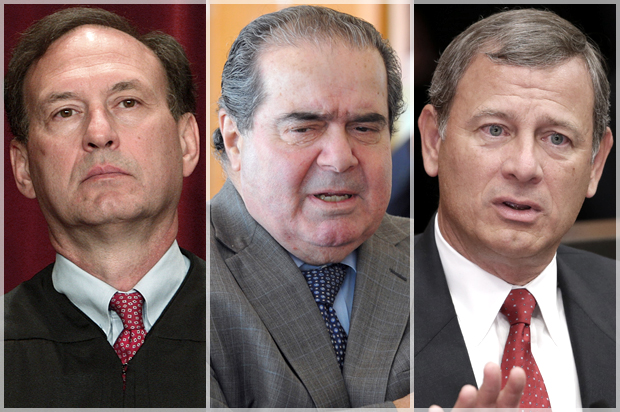The Supreme Court heard oral arguments yesterday for Obergefell v. Hodges, aka “the gay marriage case.” Many thought this case would be a cinch: that the same majority that struck down a central provision of the Defense of Marriage Act two years ago would surely regroup this term to find a constitutional right to same-sex marriage. That may still be the best bet, but it’s a bet.
Because during yesterday’s arguments, we got another reminder that our Supreme Court is dominated by five conservative justices who could switch places with five World Net Daily commenters without anyone noticing the difference. Did you know that MARRIAGE has been between ONE MAN and ONE WOMAN for 100 TRILLION YEARS and now BIG GAY wants to REDEFINE it? When JOHN ROBERTS looks in an OLD DICTIONARY, he doesn’t see “ADAM AND STEVE” under MARRIAGE.
CHIEF JUSTICE ROBERTS: Well, you say join in the institution. The argument on the other side is that they’re seeking to redefine the institution. Every definition that I looked up, prior to about a dozen years ago, defined marriage as unity between a man and a woman as husband and wife. Obviously, if you succeed, that core definition will no longer be operable.
[…]
CHIEF JUSTICE ROBERTS: No. My question is you’re not seeking to join the institution [of marriage], you’re seeking to change what the institution is. The fundamental core of the institution is the opposite-sex relationship and you want to introduce into it a same-sex relationship.
Justice Kennedy was the swing vote in the Windsor case that struck down DOMA, and liberals are hoping that he’ll be the fifth vote here, too. (Obviously don’t even consider Scalia or Alito or Thomas, who spent most of the hearing talking about Ancient Greek sex parties, fretting about The Polygamy or, in Thomas’ traditional case, saying nothing.) Kennedy may side with Big Gay in the end, but he too couldn’t mask his worry about, well… 100 TRILLION YEARS!
JUSTICE KENNEDY: One — one of the problems is when you think about these cases you think about words or cases, and — and the word that keeps coming back to me in this case is — is millennia, plus time. First of all, there has not been really time, so the Respondents say, for the Federal system to engage in this debate, the separate States. But on a larger scale, it’s been — it was about — the same time between Brown and Loving as between Lawrence and this case. It’s about 10 years. And so there’s time for the scholars and the commentators and — and the bar and the public to — to engage in it. But still, 10 years is — I don’t even know how to count the decimals when we talk about millennia. This definition has been with us for millennia. And it’s very difficult for the Court to say, oh, well, we — we know better.
It would be difficult for the Court to say “we know better” on a major social case like this if the Court were actually saying “we know better” — as in, going directly against social norms. But in this case it would not be going against social norms and attitudes toward gay people as they’ve been trending over the past couple of decades. The Court would more likely be saying “we know better” than the public on this if it didn’t recognize same-sex marriages, as safe majorities of the American people now do: You all have decided that you’re mostly OK with same-sex marriage, but we five justices, speaking on behalf of The Millennia, will have to resist.
There’s something about conservatives’ appeal to the Tradition of the Millennia here that doesn’t sit right. Kennedy mentioned Lawrence v. Texas, the 2003 case that finally swept anti-sodomy laws from the books. Until 2003, it was still a-OK for states to maintain statutes criminalizing consensual sexual acts between members of the same sex.
Tradition can be ugly. And until this millennium, one of America’s long-standing traditions was to treat homosexuality as a perversion that, when acted upon, should be met with State prosecution. Sure, it’s a little rich for Ted Cruz to bang the drums against gay marriage and then go collect money from wealthy gay donors. But Ted Cruz wouldn’t call the cops on them. A politician of his conservatism not so long ago may well have, or would’ve gotten into severe political trouble for not doing so. Not that those rich guys would have been publicly out a few decades back, anyway, because it would have ruined their careers.
Majorities of Americans have come to recognize that in all those millennia in which gay people were treated as perverted criminals deserving death– as they still are in certain countries with which we wouldn’t want to associate ourselves — we were wrong as a society. Those traditions were bad. No, or perhaps I should say very few, Americans weep for the disappearance of such traditions as throwing rocks at gay people until they’re dead. When it comes to the way civilizations treated gay people for millennia, the more we change, the better, and that includes changing marriage to what it always should have been.

